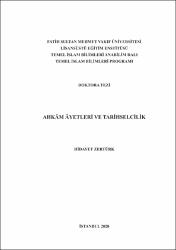Ahkâm Âyetleri ve Tarihselcilik
Künye
ZERTÜRK, Hidayet, Ahkâm Âyetleri ve Tarihselcilik, Fatih Sultan Mehmet Vakıf Üniversitesi Lisansüstü Eğitim Enstitüsü Temel İslam Bilimleri Anabilim Dalı, Yayımlanmamış Doktora Tezi, İstanbul 2020.Özet
Ahkâm ayetleri, fıkıh açısından ibadât, muamelât hudûd/ceza bölümlerini kapsamakla, beşer yaşamında temel bir unsur oluşturmaktadır. Aslında bu sayılan yönlerin her biri, inanç ve ahlak hükümleriyle de sıkı bir ilişki içerisindedir. Tarihselcilik, Islam coǧrafyasında genelde Kur’an’ın anlaşılmasına yönelik bir metodoloji sorunsalı olarak ortaya çıkmıştır. Ancak bu düşünce tarzının, ahkâm ayetlerini, M.VII. asır ile kayıtlaması ve üstelik bunların, çaǧın yapısıyla uyuşmadıǧını ilan etmesi, meselenin salt bir metodoloji girişimi olmadıǧını göstermesi açısından önemli bir noktada durmaktadır. Batıda, kendi şartları ve sorunları içerisinde ortaya çıkan bu algı biçiminin Müslüman bir zihin yapısıyla nasıl bir ilişki içerisinde olacaǧı, her iki ayrı toplumun tarihi alt yapılarını da mülahaza etmemizi gerektiriyor. Işte bütün bu kritik noktaları bir arada deǧerlendirerek önce Batıdaki tarihselcilik ve bunun neticesinde oluşan Hristiyan vahiy algısı ve bunun bu haliyle Islam coǧafyasına yansıması yani, tarihselci düşünüşün vahiy ve Kur’an algısı temelde araştırıldı. Ardından bu anlayışın hükümlere yaklaşma üslupları ve neticesinde itiraz malzemesi olarak kullanılan tikel konular, uygun bir detayla delillendirilmeye çalışıldı. Itiraz ve iddialar, genelde ahkâm ayetleriyle sınırlı tutulup ona göre kaynaklara müracaat edildi. Nihayet deǧerlendirme ve mukayeseler ona göre yapıldı. Ayat al-ahkâm, in the context of jurisprudence, are an essential part of human life because they encapsulate ‘ibadat (acts of worship), mu’ amalat (daily transactions), and ‘uqubat (punishments). In fact, each of these subjects has a close relationship with rulings concerning belief and ethics. Historicism generally appeared as a methodological problem in the Islamic World in the context of understanding the Quran. However, this way of understanding limits the application of the ayat al-ahkâm to the 7th Century, and declares them incompatible with the structure of the modern era, which shows us that it is not just a methodological enterprise. This style of understanding emerged in conditions and problems peculiar to the West. In order to understand how it interacts with the Muslim mind, we should keep in mind the historical background of these two diRerent societies. This study evaluated all of these critical points. It examined Historicism in the West, the perception of revelation among Christians resulting from it, and its reflection in the Muslim world – meaning the understanding of the Quran and revelation in the thinking of the Historicists. Then the study discussed in detail their approach to rulings. Particular subjects, and their objections to them resulting from this methodology, were also discussed in detail. The objections and claims examined were limited generally to those related to ayat al-ahkâm, and only relevant literature was chosen. Conclusions and comparisons were expressed in such a manner.



















